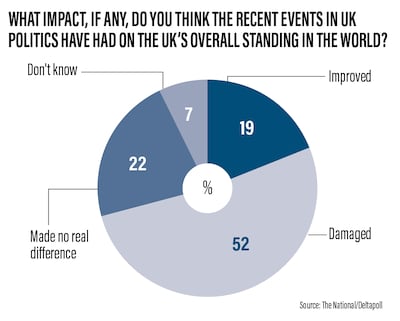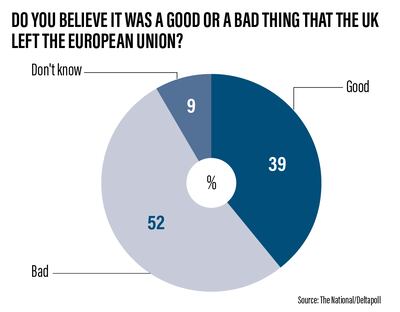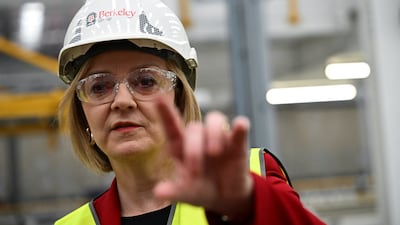The British public are getting to know Liz Truss, but they are nowhere near knowing her and forming a proper opinion of the new prime minister.
That's one conclusion to be drawn from the finding in The National poll that more than half, 52 per cent, of respondents are not confident Truss will be an effective world leader. Another is that they believe she will be a failure.
The latter will point to the plunge in the pound as being caused by her unfunded tax cuts. Her supporters will say it is as much down to the strength of the dollar as her policies. They maintain that after a decade and more of UK economic stagnation, something had to change — and she will be proved audacious and spectacularly right, and currency speculators cynical and hopelessly wrong.
The truth, surely, is that it is too early to tell. Truss comes to the role having held numerous senior jobs in government, including latterly at the Foreign Office. In none of them, though, did she leave her mark; and not to a degree that would make her an instantly recognisable figure, one about whom it was possible to provide a knowledgeable assessment.
As foreign secretary, she was not in the job for a year. And besides, there are few opportunities to gain a reputation on the global stage. Major summits and gatherings are the domain of leaders, not foreign ministers. Similarly, it is the prime minister who fills the world’s newspaper column inches and photographs ― and whose visits, speeches and asides are faithfully reported.

Truss attracted the wrong sort of coverage for her decision to pose in an army tank like Margaret Thatcher. It was a mistake, but one that may well have fuelled answers when these pollsters asked their questions.
Similarly, Truss invited national and international ridicule when she said the “jury is out” on whether France’s Emmanuel Macron is a “friend or foe” to Britain. To her credit, she quickly pulled back on this statement. Macron’s warm reaction after Queen Elizabeth II's death and the choice of France as the first foreign destination for a visit by King Charles III suggests there is little harm done.
In this respect, Truss appears more astute than her predecessor. Boris Johnson frequently blundered and then would compound the error with either no attempt at an apology or something that was totally half-hearted and entirely unbelievable.
This, in a nutshell, is her problem and probably best explains the pessimism regarding her likely overseas standing. Truss, by dint of having little track record of her own, comes to the premiership on the back of Johnson. She inherits his baggage, which did not win him many admirers.
That 52 per cent also think that recent events in UK politics have damaged the UK’s standing in the world and, again, 52 per cent believe that having Johnson in charge damaged the UK’s global standing, suggests this is the exact same 52 per cent on each occasion.
Johnson’s support for Ukraine, which he exploited mercilessly, was a notable foreign success. The embattled Ukrainian President Volodymyr Zelenskyy held the mantle of being Johnson’s one world leader friend.

With Ukraine, too, Truss perhaps in trying to emulate Johnson, displayed a reckless side. She cited Vladimir Putin as a “rogue operator” and risked inflaming Russian hostility. With Putin’s escalation of the conflict and his threat to use nuclear weapons, Truss’s comment now seems well-judged. It does, however, leave the UK very much in the Russian president’s sights; although to be fair, Johnson’s belligerence made that a certainty.
The challenge to Truss is that having served in Johnson’s administration, having been elected by the same party that chose him, having backed the manifesto that saw the Conservatives win a thumping majority, she now has to put distance between herself and the past. Until she achieves that, Truss will be judged on what went before.
On the economy, she is moving at lightning speed ― too fast for even some of her fellow Tories. Domestically, Truss is able to do that ― as prime minister, she has control of the levers that direct internal policies. Abroad, it is much more problematic. She is unable to dictate events, not in the same fashion; there are not the set pieces and when there are, things do not usually move so quickly, and she must take account of other nations’ feelings and interests.
Truss received an education in this when she had to strike trade deals post-Brexit. She concluded some, but the main one, the prize that Johnson boasted would occur with the US, has not materialised. Neither is it likely to, not anytime soon.
Joe Biden’s disregard for her overtures for a trade deal and his insistence on an acceptable solution to the riddle of Northern Ireland’s post-Brexit status does not augur well for Truss’s global standing. There again, if she was able to reach an accord, it would improve immeasurably ― and not least because Johnson appeared so disinterested. If she wants to earn plaudits everywhere, at home and overseas, Truss would be advised to grasp the Ulster cross-border trading nettle and to not let go until a widely approved answer is achieved.
Biden’s condemnation of “trickle-down” economics, exemplified by British Chancellor Kwasi Kwarteng’s shock mini-budget, however, show how much work the prime minister has to do to win over the White House.
Another foreign affairs mandate is contained in the poll, with those in favour of closer ties with the EU heavily outweighing those who believe the focus should be outside the bloc. More than half, 56 per cent, wish to see the UK have a stronger relationship with the EU than at present. This is more than double the proportion who think the aim should be to preserve the current relationship. It is also eight times the proportion, 7 per cent, who think the UK should be aiming for a weaker relationship with the EU than at present.
Put this alongside the answer to the Brexit question ― that a majority believe it was a bad thing that the UK left the EU, with a large number, 46 per cent, maintaining Brexit has gone worse than expected, versus the only 19 per cent who feel it has gone better ― and Truss is in a bind.
Telling the prime minister to cosy up to the EU is one thing. However, this is a PM who received the endorsement of the Brexit-supporting wing of her party, MPs included, the very faction that put Johnson into office. That is the Brexit, too, with one eye on a coming general election, that a hefty slice of the British public is so unimpressed by.

Truss has to walk a fine line, of charming the EU while not being seen to disavow Brexit. The UK has departed the EU so in that sense, Brexit is over, there is no going back. What Truss must do is to find harmony with the EU, while not getting too close, resolving a stand-off in such a way that Britain benefits economically. She can begin by earning the EU leaders’ respect, something that Johnson singularly failed to do.
Truss coveted the succession. That does not mean it would ever be easy, not overseas, not following Johnson. How difficult, she is only now beginning to discover.


